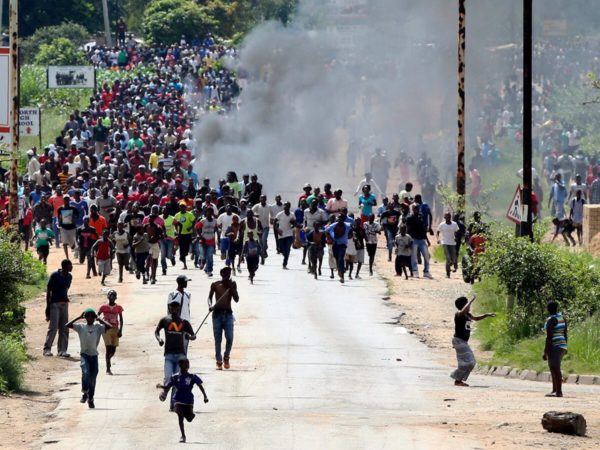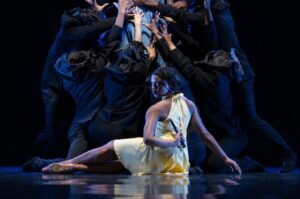
The television is on mute, I can’t switch it off because I need the illusion of company. Everyone turned in early tonight. I am restless. In four days I’ve barely left the house, I almost miss my low-paying dead-end job. At least it gives me some sense of purpose. Today was particularly hard, with the internet shut off and roads closed down. I do not believe I have ever felt so isolated in my life. Except maybe for that one time when I worked in a small town where I knew no one for two months. I eventually made friends, but by that time I was already leaving so it didn’t count for much. It will be three years this May and they still owe me money for that job. The money has lost most of its value but I want it anyway, so I make a habit of calling the manager once in a while. He says they are “working on it.”
Nobuntu keeps me company. Since inflation sky-rocketed I am more liberal with my finances. I can now afford luxuries like music and art—the money doesn’t buy much else these days and is impossible to save. I was on a call with my sister the other day and she asked me what I was up to. I told her I was at work, to which she responded, “Shanda hama yangu, shandira Mazoe ne cooking oil.” I laughed about it, but after I cut the phone, I felt a bit depressed. Zimbabwean humour: it is as hilarious as it is a knife to the heart. Somehow the ancient ivory-coloured clock on the wall ticks and tocks louder than my a cappella. How that thing still works, I will never know! It certainly has more tenacity than bond notes. . . .
It is forty-five minutes until the next news bulletin. I know it will sound like the last two I watched. I’m anxious. Most of my friends and relatives are safe, I did a round of phone calls in the afternoon. I got as far as our bus stop yesterday evening, there were no cars. This morning, it’s the birds that woke me and not kombi conductors shouting: “TM Hyper! Siyahamba masalu?? Town? Uyahamba e town bhudas??” The silence frightens me. Even more so in the evening. Apparently, boys from other neighbourhoods came to loot the Magwegwe North shops. J Themba was looted yesterday. My auntie says she can still hear the noise at Nkulumane sekusile.
I look at the muted lady speaking on TV. I don’t know what she’s saying but I know it’s all propaganda and lies. I wonder how she does it, how she manages to open her mouth and speak such untruths. Father said it’s a job, just like mine. He said that I don’t like my employer but I go there every day, they are just doing the same, the only difference being they have to endure that shame in front of the whole nation. Father has a good heart, he sees the best in people. I am much less trusting. A different programme is on now. Two women wearing African print in what appears to be a library. The age of the new, enlightened African scholar is upon us, all hail their PhDs.
My social media withdrawal symptoms are subsiding. At least the emptiness got me writing. I don’t judge the looters, we are hungry and some are willing to do more than others to eat. The shop owners are unfortunate, but my heart is more broken for the bereaved and their dearly departed. Is this just the way it will be from now on, human sacrifices every couple of months, enquiries, public outrage and Twars? It’s almost time for the news again. I see no reason to keep doing this to myself; letting lies chip away at one’s soul probably does not count as atonement. I turn off the TV and shuffle to my room in the dark, laptop and phone in hand. As I settle into my bed to sleep, I whisper a prayer, asking God to make sure that those who died did not do so in vain. I lie awake for another hour or two, paying for the involuntary nap I took in the afternoon.
Further to a warrant issued by the Minister of State in the President’s Office for National Security through the Director General of the President’s Dept., acting in terms of the Interception of Communications Act, Internet Services are currently suspended across all networks and Internet Services Providers. We are obliged to act when directed to do so and the matter is beyond our control. All inconveniences are sincerely regretted.
The time stamp on the SMS is 04:54 a.m. I only saw it at around seven or eight. I am angry and agitated for some reason. It must be the heat, it rained a bit yesterday, with even handfuls of hail, but my room feels like a furnace and the walls appear to be closing in. “Must get out,” I whisper to no one in particular as I put on my ugly home clothes. I splash water on my face and brush my teeth. “Mangwanani Daddy, ndichamboenda ku bus stop.”
I never take walks. The sun is in my eyes as I trudge up the road. The vendors have abandoned the bus stop, the few bold enough to sell are doing so from their homes. I walk past where the vendors should be and over a barricade made up of rocks and stuff. A few meters up the road are remains of burnt tyres. I should have worn a hat, but my hair is a mess so it wouldn’t have changed anything except to save the neighbours from the eyesore that is my bed hair. There are at least three more barricades along the one-kilometre stretch—rocks, pillars, large pieces of metal. I think most of the street signs have been vandalized.
I see a group of men heading for the shops from a distance. This is no longer my neighbourhood, I feel uneasiness in my guts. I do a quick body count; there are other women walking about, I am not the only crazy female loitering this morning. The group has settled down under an acacia where the cobbler usually is. I overhear words like “looting” and “Choppies” as I pass by. To my relief, they pay me no mind, consumed in their conspiracies. The shops are closed. I have no intentions of going any further; it’s not like I will find what I am looking for, so I turn back.
“What did you find?”
Father is amused that it takes the entire nation shutting down for me to take a stroll in our township.
“Just barricades and closed shops.”
It is nine o’clock, breakfast time. There is no bread. I take the flour I panic-bought after the fuel price increase and whip up something. The official story is that I am making tea scones but I doubt whatever came out of the oven qualifies. All that matters is that they are edible (sort of). I text friends and family again. I pretend it is because I am concerned for their safety, but I’m just lonely. I know none of them would be dumb enough to try and go anywhere under the current circumstances. Evans jokes about how we will soon have to send each other memes via smoke signals. He’s in Vic Falls: that place is barely Zimbabwean—tourists, polite police, you would think it is another country.
Takudzwa finally wakes up. He says people were getting robbed in front of them the previous night.
“Why didn’t you intervene?”
“What, and die for someone else’s pack of groceries?”
It makes sense; this is not the time to play hero.
“I’m not going out today.”
“You better not mpfanha, I won’t come looking for you.”
He rolls his eyes as little brothers are prone to do.
A girl ought to bath, the heat is ungodly. Perhaps it is signalling rain. Or just that we have already died and this is our own personalised hell as a nation.
16:30 hours, there is someone at our gate. I go out and it’s Nyoni’s kid. He’s a polite boy, greets me every evening when I pass by the front of their house from work.
“Etha, u SaTakudzwa ukhona? Bayamcela.”
My little brother is more famous than me in these parts so they call my father by his name. I should be jealous but I’m not the firstborn so it makes very little difference.
“Uyageza, wothi ngimtshele.”
While I’m still talking to the boy, a lady from the line across the street calls out: “Tell your Father to come quickly, it’s important!”
The grown-ups in our neighbourhood are always having one type of meeting or another. I pay no mind to it as I shout through the bathroom door, “Baba murikutsvagwa, handzi muuye nemwana wa Nyoni!”
I go back to my room to finish watching The Matrix Reloaded. That scene where Morpheus has a gun in one hand and a samurai sword in the other on the freeway in front of an exploding vehicle makes me squeal with delight! The sound is purely involuntary, and I laugh at myself for being such a nerd. I love the Wachowskis.
“Ropa, Taku, come here,” Father summons us in his serious voice, to the living room. I wonder what is going on. We scuffle to the living room, neither of us is willing to give way and the passage is not big enough for both our egos. Father is standing right in the middle of the room with a cigarette in hand. He never smokes inside the house. “I have some terrible news.”
He proceeds to tell us how Janet and her daughter, Nomsa, were found dead in their bed. Her husband hasn’t been seen for a while. They have what looks like axe wounds on their chests. Nobody really knows what happened, their tenants had to break into their bedroom after knocking for hours. After words like “dead” and “murder” are thrown about, one’s mind ceases to operate normally. Father has to head back, there are calls and arrangements to be made.
I saw my first dead body when I was seven. It was Mother’s. Death is not new to me. Murder, on the other hand, is an entirely different thing. What does a girl do when she finds out that another girl has just been murdered in the same street she has lived in since she was born? The girl next door is a cop. She is on night shift this week; this should be her afternoon off. They’ve found the man, and his suicide note. Something about infidelity and goblins. Some other thing about loving his daughter too much to let her live through the horror of what he had done. In his own mind, he was just being a good father.
I cannot help but draw a contrast: is this what they think, when they block our Internet access and threaten us with violence, when stray bullets strike us in our homes, that it is what’s best for us? In a sick and twisted sort of way, are they saying that they love us and are only doing these very horrible things to us to protect us? I call my sister, tell her about the tragedy. She cannot believe it. Such things only ever happen in the papers and on IDx. Suddenly the state of the nation no longer seems as pertinent as it did a few hours ago.
My room no longer feels as small, instead it feels safe. The Red Priestess is wrong: it is not only the night that is dark and full of terrors. Horror does not wait for you to shut your eyes and drift off before it visits. Terrors abound all day, in the most unlikely (inconvenient?) of places. I feel sorry for Father—he had to see their corpses. I whisper a prayer as I drift off, ask God to help him sleep.
06:45 a.m. More cars are moving around, fewer people are looting. The police don’t come for the corpses until it’s late, police cars get stoned in these parts. Plus our local station has only one metal box, it’s not prepared for such a high turnover of corpses. They borrow from Emakhandeni or someplace. A lady from the house across Janet’s gave birth at home that night. It’s ironic, birth and death, how neither an ambulance nor a hearse could reach us. The whole neighbourhood could perish and no one would be able to come get us, or save us, or bury us.
About the Writer:
Tinashe Tafirenyika, 26, is a poet. In 2017, she became the first woman and youngest person to receive a National Arts Merit Award (NAMA) in Spoken Word Poetry in Zimbabwe. The same year, she also received a Bulawayo Arts Award (BAA). In 2018, she became the first person to win the NAMA twice in the Spoken Word Poetry category and released her first poetry video, “Sarah Baartman.” A winner of the House of Hunger Poetry Slam in Harare and Shakespeare Lives Poetry slam in Bulawayo, she performed at the Book Café and Shoko Festival in 2013. Her work has appeared in The Zimbabwean, Kalabash Media, the Badilisha Poetry Xchange/Indiefeed Poetry Radio project, Poetry Potion, Poetry Bulawayo, and Bozza. Her poetry videos can be found on YouTube. When not stringing words together, Tinashe practices as a Medical Laboratory Scientist in her home town, Bulawayo.









走失在迷雾中 – CIMIAN November 20, 2023 00:08
[…] [20] 迪纳舍(Tinashe Tafirenyika),“津巴布韦关闭”,《脆纸》杂志,2019 年1 月 27 日。➝ […]